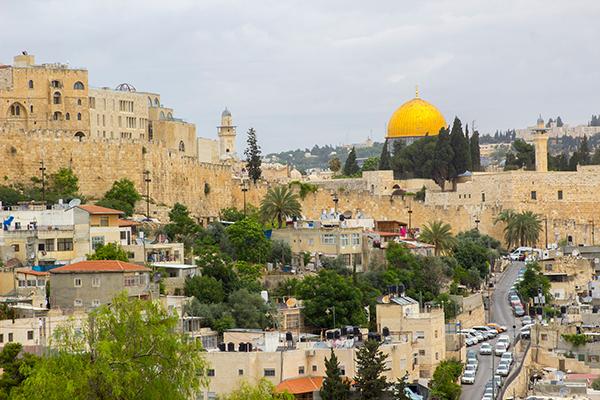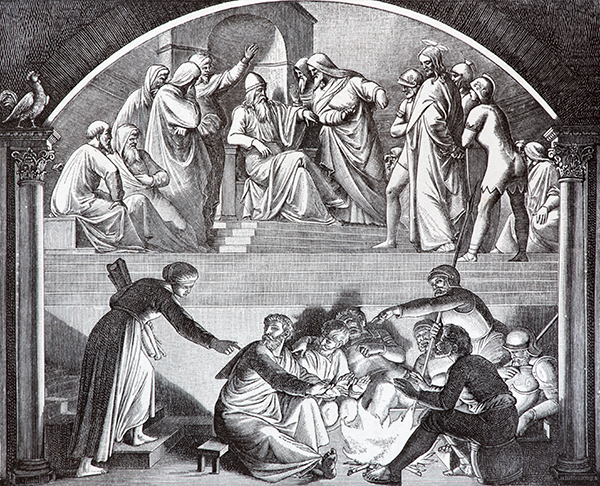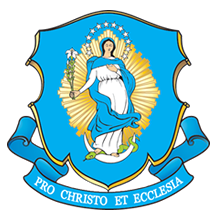
A view of the Dome of the Rock on the Temple Mount in Jerusalem across the city from the rooftop of the ancient Caiaphas's Palace (Adobe Stock)
I had it in my head that Jesus had been brought to the Temple on Holy Thursday night. And yet it turns out that it was to Caipahas’ house they’d gone, and kept Christ in a pit overnight after arresting Him in the Garden of Gethsemane.
By Chris Sparks
Lord, give us holy priests; You yourself maintain them in holiness. O Divine and Great High Priest, may the power of Your mercy accompany them everywhere and protect them from the devil’s traps and snares which are continually being set for the souls of priests. May the power of Your mercy, O Lord, shatter and bring to naught all that might tarnish the sanctity of priests, for You can do all things (Diary of Saint Maria Faustina Kowalska, 1052).
To me, Caiaphas’ house was an unexpected stop on a Holy Land pilgrimage. I had it in my head that Jesus had been brought to the Temple on Holy Thursday night. And yet it turns out that it was to Caipahas’ house they’d gone, and kept Christ in a pit overnight after arresting Him in the Garden of Gethsemane. There, Simon Peter denied Christ three times, and a cock crowed in the courtyard, and Peter fled and wept.
When I say “a pit,” I mean we went down into the bottom of what looked like a dry well, a round, brick or stone-lined dungeon where, tradition has it, Jesus spent the night before He died. We stood, and we prayed. Some knelt, and some even kissed the ground. It would have been dark, unless torches had been provided for a prisoner hated by the political class, by the powers that were in the first century city of Jerusalem. It may not have been as dry then as it is now, or as clean.
Betrayal and repentance
No matter what, the Son of the Father was thrown into a pit, kept in the belly of the beast of Caiaphas’ corruption, and in the courtyard above, Simon Peter had denied Him three times.
There’s artwork in that courtyard to commemorate that betrayal, and that repentance. The whole place is preserved and maintained as few homes from ancient days are preserved or maintained.
And it’s amazing to me because it’s the home of so many failures of humans in authority, of humans in power. We have made a place of prayer out of a house of failure, of weakness on behalf of two of the most powerful, most influential men in human history. Here at the home of Caiaphas, the high priest, leader of the Jewish religion, Caiaphas didn’t just fail to recognize his God when that One stood before him. Caiaphas accused Christ of blasphemy and had Him imprisoned before sending Him to the Roman authorities for execution.
And Simon Peter, the Rock, the first pope, Caipahas’ equivalent in the New Israel of the Church, failed to acknowledge Jesus before others, an act that merits a severe consequence, according to Jesus (see Mt 10:33).

Power through weakness
Two men, with similar roles — one in the Old Covenant, and one in the New — show that humans usually don’t recognize the presence or the power of God. The vicars of God can and do fail. That sort of failure is written into the history that is at the heart of our religion, and the power of God is shown through their weakness.
After all, here we are today. Who’d have thought that Caiaphas’ house would become a house of prayer for all nations? Who’d have thought his failure of discernment, his failure of fidelity, was so essential to the plans of God? Who’d have thought that God would bring the redemption of all through the calculations of Caiaphas? Indeed, the Spirit of the Lord was upon him; Caiaphas was the Lord’s anointed, for he prophesied truly:
So the chief priests and the Pharisees convened the Sanhedrin and said, “What are we going to do? This man is performing many signs. If we leave him alone, all will believe in him, and the Romans will come and take away both our land and our nation.” But one of them, Caiaphas, who was high priest that year, said to them, “You know nothing, nor do you consider that it is better for you that one man should die instead of the people, so that the whole nation may not perish.” He did not say this on his own, but since he was high priest for that year, he prophesied that Jesus was going to die for the nation, and not only for the nation, but also to gather into one the dispersed children of God. So from that day on they planned to kill him — Jn 11:47-53.
And Simon Peter repented and went on to become exactly what Christ had said he would be — a firm foundation for our faith till the end of the world, not in spite of his weakness, but because of it.
When Christ at a symbolic moment was establishing His great society, He chose for its cornerstone neither the brilliant Paul nor the mystic John, but a shuffler, a snob, a coward — in a word, a man. And upon this rock He has built His Church, and the gates of Hell have not prevailed against it. All the empires and the kingdoms have failed, because of this inherent and continual weakness, that they were founded by strong men and upon strong men. But this one thing, the historic Christian Church, was founded on a weak man, and for that reason it is indestructible. For no chain is stronger than its weakest link — G.K. Chesterton
Hope for all
There at the house of Caiphas, the Rock on which the Church was to be founded was anything but rock-like; there, the most relatable sort of betrayal occurs, as well as the most relatable sort of repentance. There, Peter gave all of us hope; if the first pope can repent of denying Jesus at the time of His Passion, return to fidelity again, and become a saint, there’s hope for all of us.
So let us pray for the Vicar of Christ, and for all those who stand in persona Christi capitis (in the person of Christ the Head).
Let us pray for all those who serve as the face of God to others, the poor and those who aid the poor, the fathers of spiritual families and of biological families, the Christians and our neighbors alike. Let us remember that it was the failures of men that permitted the triumph of God, and take heart.
And we know that all things work together for good to them that love God, to them who are the called according to his purpose (Rom 8:28)
Previous article
{shopmercy-ad}
















